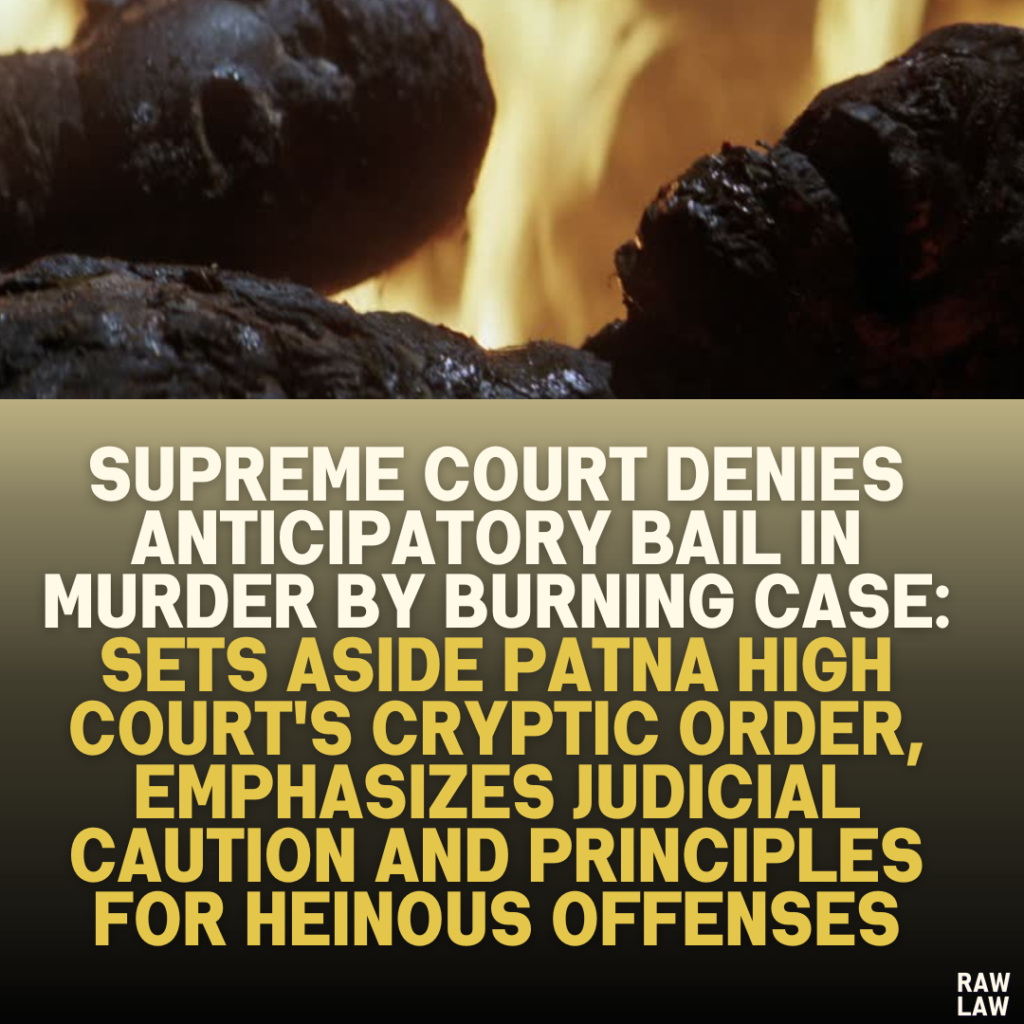Court’s Decision
The Supreme Court allowed the appeal filed by the complainant and set aside the Patna High Court‘s order granting anticipatory bail to respondents 2 to 4. The Court directed the accused to surrender before the Trial Court within four weeks and allowed them to file for regular bail, which would be decided based on its merits, uninfluenced by any observations made in the present judgment.
Detailed Breakdown
Facts
- Incident and FIR:
The appellant’s nephew was allegedly set ablaze after being doused with kerosene by the accused (respondents 2 to 4), following an altercation related to the deceased’s relationship with one of the accused’s daughters. The victim succumbed to burn injuries during treatment.- FIR was initially registered under Sections 341, 323, 307, 504, and 34 IPC.
- Following the victim’s death, Section 302 IPC (murder) was added.
- Procedural Background:
- The Sessions Court rejected the anticipatory bail application of respondents 2 to 4.
- Subsequently, the High Court granted anticipatory bail without adequately considering the materials on record, including the chargesheet which indicated the allegations were substantiated.
- Aggrieved by the High Court’s decision, the appellant filed the present appeal before the Supreme Court.
Issues
- Did the High Court err in granting anticipatory bail in a case involving serious allegations of murder?
- Is anticipatory bail appropriate given the nature and gravity of the offense?
Petitioner’s Arguments
- The High Court’s order granting anticipatory bail was passed in a cryptic and mechanical manner, disregarding the serious allegations and corroborative evidence in the chargesheet.
- The relief of anticipatory bail in such a heinous offense undermines the principles of justice.
- The specific averments in the FIR and investigation findings make the grant of anticipatory bail inappropriate.
Respondent’s Arguments
- Despite notice, the accused initially failed to appear before the Supreme Court and later instructed their counsel to withdraw representation, leading to the issuance of non-bailable warrants.
- Upon subsequent appearance, they argued for the relief, without adequately addressing the gravity of the offense.
Analysis of the Law
The Supreme Court referred to its landmark decision in Sushila Aggarwal v. State (NCT of Delhi) (2020), which sets out the principles for granting anticipatory bail:
- Nature and Gravity of the Offense: Serious offenses like murder necessitate a higher threshold for granting anticipatory bail.
- Role of the Accused: The allegations indicated the active involvement of all respondents in the heinous crime.
- Material on Record: The chargesheet and FIR substantiated the claims, leaving little room for doubt about the accused’s role.
The Court emphasized that anticipatory bail is not a matter of routine and requires judicial discretion exercised with utmost caution.
Precedent Analysis
The Court reiterated the principles enunciated in Sushila Aggarwal, emphasizing the importance of:
- Considering the nature of the allegations.
- Assessing the available evidence.
- Ensuring that the relief does not impede the course of justice in serious offenses.
The decision underscored that anticipatory bail is an extraordinary remedy and should not be granted mechanically or arbitrarily.
Court’s Reasoning
- Factual Context:
The FIR and chargesheet contained explicit allegations against the respondents for their involvement in setting the victim ablaze with the intent to kill. - High Court’s Lapses:
- The High Court failed to consider the seriousness of the offense.
- The decision was deemed “cryptic and mechanical,” ignoring key materials on record.
- The relief of anticipatory bail in a murder case involving gruesome allegations was held to be against the established principles of law.
- Principle of Judicial Caution:
The Supreme Court held that anticipatory bail in a heinous crime like murder requires a cautious approach, and the High Court’s order did not reflect such diligence.
Conclusion
The Supreme Court set aside the High Court’s order granting anticipatory bail and directed the accused to surrender within four weeks. It clarified that they could seek regular bail, which would be decided on its merits without being influenced by the present judgment.
Implications
- Judicial Discretion:
The decision reinforces that anticipatory bail should not be granted lightly, particularly in cases involving heinous crimes like murder. - Accountability:
High Courts must exercise greater caution while granting anticipatory bail to ensure justice is not compromised. - Upholding Legal Principles:
This ruling underscores the judiciary’s commitment to maintaining the sanctity of established legal principles in granting pre-trial relief. - Guidance for Lower Courts:
The judgment serves as a precedent, emphasizing the importance of scrutinizing evidence and allegations meticulously before granting relief in cases involving serious offenses.
This detailed analysis reflects the Supreme Court’s emphasis on upholding judicial propriety and ensuring that justice is served in cases involving grave allegations.




Pingback: Bombay High Court Upholds Termination of Developer’s Authority: "Conveyance Deed Executed Using Terminated Power of Attorney Cannot Be Valid" - Raw Law
Pingback: Delhi High Court Appoints Sole Arbitrator Under Section 11(6) of the Arbitration and Conciliation Act: "Judicial Role is Limited to Validating the Existence of Arbitration Agreements" - Raw Law
Pingback: Bombay High Court Acquits Accused in Rash and Negligent Driving Case: "Prosecution Failed to Prove Beyond Reasonable Doubt That the Accused Was Driving the Vehicle" - Raw Law